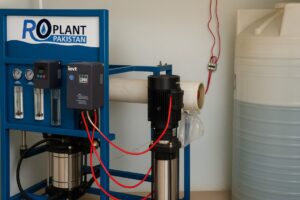Access to clean and safe drinking water is a basic human right – yet millions around the world still lack it. In communities like Khano Goth, contaminated water is not just an inconvenience; it is a life-threatening challenge that contributes to widespread illness. Guardians Hands has taken a stand against this crisis through its RO Plant Project, providing clean water to those who need it most.
To understand why this project matters so much, it’s essential to first explore what are waterborne diseases, the dangers they pose, and why RO plants are the most effective solution in preventing them.
What are Waterborne Diseases?
The term waterborne disease refers to any illness caused by microorganisms present in contaminated water. These diseases occur when people drink, bathe, or cook with water that contains harmful bacteria, viruses, or parasites. The definition of waterborne diseases covers a wide range of infections – from mild gastrointestinal issues to severe, life-threatening conditions.
Waterborne diseases are often spread through:
- Pathogens and waterborne diseases such as bacteria (E. coli, Vibrio cholerae), viruses (hepatitis A, rotavirus), and parasites (Giardia, Cryptosporidium).
- Consumption of water contaminated with human or animal waste.
- Poor sanitation and inadequate filtration.
In places where infrastructure is lacking, such as Khano Goth, the risks are significantly higher, making preventive measures a necessity rather than a luxury.
Deadly Waterborne Diseases and Their Global Impact
Waterborne diseases are among the deadliest preventable illnesses in the world. According to the World Health Organization, unsafe water causes hundreds of thousands of deaths annually, with children being the most vulnerable. Some of the most deadly waterborne diseases include:
- Cholera – Caused by Vibrio cholerae, leading to severe diarrhea and dehydration.
- Typhoid fever – Resulting from Salmonella typhi infection, often linked to contaminated drinking water.
- Dysentery – Triggered by Shigella bacteria or amoebas, leading to severe intestinal inflammation.
- Hepatitis A – A viral infection that affects the liver, transmitted through contaminated water.
- Giardiasis – A parasitic disease causing gastrointestinal distress, fatigue, and malnutrition.
The tragedy is that all of these illnesses are preventable with access to clean, safe drinking water.
Discuss the Health Consequences of Dehydration and Waterborne Diseases
The health impacts of waterborne diseases go far beyond the initial infection. Chronic exposure to contaminated water can lead to:
- Severe dehydration – Particularly dangerous for children and the elderly, dehydration from diarrhea can become fatal if not treated promptly.
- Malnutrition – Persistent gastrointestinal issues reduce nutrient absorption.
- Weakened immunity – Repeated illnesses make individuals more vulnerable to other infections.
- Long-term organ damage – Diseases like hepatitis A can impair liver function, while other infections may affect the kidneys or intestines.
- Economic hardship – Medical costs and loss of income from illness push already struggling families deeper into poverty.
When we discuss the health consequences of dehydration and waterborne diseases, it becomes clear that clean water is not just about health – it’s about dignity, stability, and community resilience.
Control of Waterborne Diseases: Why Prevention Is Key
While medical treatment is important, prevention is the most effective way to address this global issue. The control of waterborne diseases relies on three main strategies:
- Improved sanitation – Proper waste disposal and hygiene practices.
- Community education – Teaching safe water storage and handling methods.
- Water purification – Ensuring that the water source itself is safe to consume.
Among these, water purification through advanced filtration systems like RO (Reverse Osmosis) plants has proven to be a game-changer in high-risk areas.
How RO Plants Work to Prevent Waterborne Diseases
Reverse Osmosis (RO) technology uses a semi-permeable membrane to filter out contaminants, including bacteria, viruses, and chemical pollutants. The benefits of RO plants in controlling waterborne diseases include:
- High-level pathogen removal – Eliminates nearly all disease-causing microorganisms.
- Improved taste and odor – Removes chlorine, sediments, and dissolved salts.
- Safe for vulnerable groups – Ensures clean water for children, pregnant women, and the elderly.
- Sustainable community health – Reduces medical burdens and increases productivity.
When communities gain access to RO-treated water, the cycle of illness is broken – paving the way for better health, education, and economic opportunities.
Guardians Hands RO Plant Project in Khano Goth
In Khano Goth, the water situation is dire. Many families rely on unsafe sources, leading to frequent outbreaks of waterborne diseases. Recognizing this urgent need, Guardians Hands launched its RO Plant Project to bring hope and health to the community.
The project’s impact includes:
- Supplying clean drinking water to hundreds of families daily.
- Reducing disease incidence by eliminating harmful contaminants.
- Promoting hygiene education to ensure safe water handling.
- Empowering the community through sustainable water access.
By directly addressing what are waterborne diseases and their causes, Guardians Hands is not just treating the problem – it’s eradicating it at its source. You can learn more and support this life-changing initiative here: RO Plant Project.
Why Your Support Matters

Projects like the RO Plant in Khano Goth are only possible through community support and donations. Every contribution helps maintain and expand clean water access, protecting families from deadly waterborne diseases and giving them the chance to live healthier, more productive lives.
By supporting Guardians Hands, you are part of the control of the waterborne diseases movement – making a lasting difference where it’s needed most.
Conclusion
Understanding what are waterborne diseases and their devastating effects is the first step toward change. Communities like Khano Goth deserve access to safe water, free from the pathogens and waterborne diseases that steal lives and opportunities.
Through advanced solutions like RO plants, Guardians Hands is proving that prevention is possible, and hope is within reach. Together, we can ensure that no one’s health is compromised because of the water they drink.
To join the fight against waterborne diseases and help expand the reach of the Guardians Hands RO Plant Project, consider donating today. Your support can save lives – one drop at a time.
